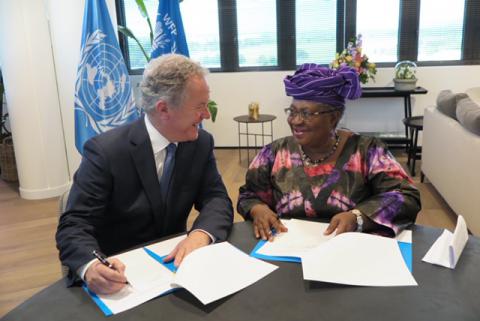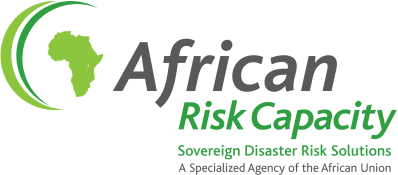
Friday, May 24, 2019
World Food Programme and African Risk Capacity Extends Administrative Service Agreement Till 2024.
“The provision of support by the WFP through the Agreement has been very critical to our success, and we hope that within the next 5-year period of its operation, ARC would have grown into a fully independent institution.” – Ngozi Okonjo-Iweala.
Rome, Friday, May 24, 2019 – The African Risk Capacity (ARC) Agency and the World Food Programme (WFP) today extended the Administrative Service Agreement (ASA) through which the WFP provides administrative and financial services to ARC thereby further strengthening the collaborative partnership between WFP and the African Union (AU).
Since the establishment of ARC as a Specialized Agency of the AU in November 2012 by African Union Member States, the WFP has been providing administrative, technical, and financial services to the Agency through an Administrative Services Agreement. The first ASA between WFP and ARC was concluded in June 2013 and a second ASA, which is currently in force, will expire on 31 August 2019.
The present Extension will be for a period of 5 years, from September 01, 2019 to 31 August 2024.
“The provision of support by the WFP through the Agreement has been very critical to our success, and we hope that within the next 5-year period of its operation, ARC would have grown into a fully independent institution”, said Dr Ngozi Okonjo-Iweala, the Chairperson of the African Risk Capacity Agency, during the official signing of the Extension at the WFP Offices in Rome.
With ARC, Africa is breaking away from the old paradigm of seeking interventions after the occurrence of a natural disaster towards a proactive management of its risks through building capacities of Member States for early warning systems and taking out climate risk insurance against perils. This assures access to rapid and predictable financing for protecting the food security and livelihoods of their vulnerable populations as well helping stabilise families and communities after disaster strikes.
“In its first four years of operations, the ARC insurance mechanism triggered over US $36 million to countries in the Sahel and Southern Africa to provide timely assistance for over 2.1 million people and 900,000 livestock affected by extreme droughts. For a paid-up premium of $67m by 8 countries, we were able to provide a $500m coverage, so we know the Mechanism works”, concluded Dr Okonjo-Iweala.
The Executive Director of the World Food Programme, David Beasley commended the African Risk Capacity for the impressive strides it has recorded since 2012. Particularly in designing customised response and insurance plans for the management of drought risks and other natural disasters towards ensuring food security on the continent.
“The WFP is happy to continue providing ARC with the ongoing assistance to enable farmers in Africa achieve better food security and resilience against climate induced disasters.”, said Mr. Beasley.
The African Risk Capacity is an African-owned, continental, early response mechanism, which offers an African solution to one of the continent's most pressing challenges.
The Extension of Agreement will boost the confidence of ARC donors and other development partners in the delivery capacity of the Agency to keep strengthening resilience systems, providing development insurance, and helping African Union Member States to better plan and respond to natural disaster risks.
# # #
About African Risk Capacity (ARC): ARC consists of ARC Agency and ARC Insurance Company Limited (ARC Ltd). ARC Agency was established in 2012 as a Specialized Agency of the African Union to help Member States improve their capacities to better plan, prepare and respond to weather-related disasters. ARC Ltd is a mutual insurance facility providing risk transfer services to Member States through risk pooling and access to reinsurance markets; it is owned by Member States with active insurance policies while the KfW Development Bank and the UK Department of International Development are capital contributors.
With the support of the United Kingdom, Germany, Sweden, Switzerland, Canada, France, The Rockefeller Foundation and the United States, ARC assists AU Member States in reducing the risk of loss and damage caused by extreme weather events affecting Africa’s populations by providing, through sovereign disaster risk insurance, targeted responses to natural disasters in a more timely, cost-effective, objective and transparent manner. ARC is now using its expertise to help tackle some of the other greatest threats faced by the continent, including outbreaks and epidemics.
Media Enquiries:
Chinedu Moghalu chinedu.moghalu@africanriskcapacity.org





